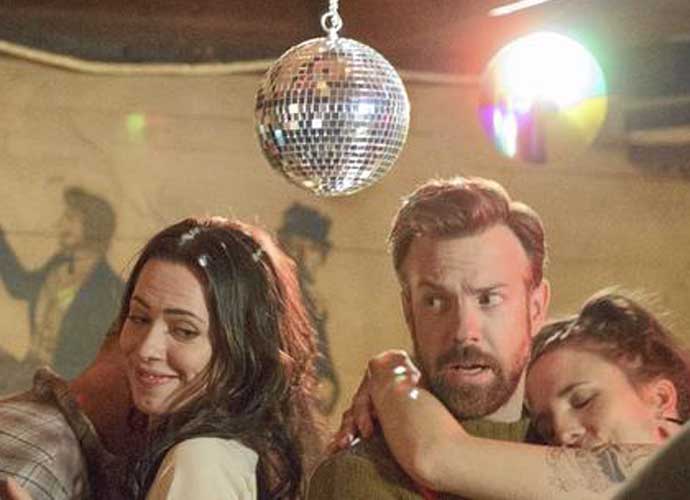‘Tumbledown’ Movie Review: A Story About Letting Go Of Love

4/5
“In the middle it feels like it’s never going to end,” says Hannah characterizing Tumbledown thematically in the opening monologue of the movie.
Hannah, played by Rebecca Hall, is a New England widow struggling with the sudden loss of her talented musician husband, Hunter. Opposite her is Andrew McHabe (Jason Sudeikis), an American History professor at Hofstra University who wants to incorporate Hunter in a book about great musicians who never had the chance to make their full mark on the world. Hannah, however, is violently opposed to this idea, as she has enlisted herself to immortalize her husband with a biography. Somehow, Hannah ends up needing Andrew’s help writing Hunter’s biography, inviting Andrew to stay with her in Maine with the intention of sharing “the truth” of Hunter’s life with him.
Although the movie is about grief, it is not a tear-jerker. The sadness is diffused by the tension between McHabe’s city perspective and the stereotypical small-town quirks and charm of Hannah’s hometown. The candid and intentionally approachable nature of the film allows the infusion of plenty of sarcasm and snark. This comic aspect occasionally falls flat, but sometimes it feels like it’s meant to. The aim of the light-hearted parts of this film is not to get people to laugh at loud, but to set the reality of a world that still has light even with grief and has people whose quirks aren’t there in order to be funny, but rather to remind you that they not exactly who you want them to be.
To be fair, it isn’t easy for Hannah to let go. From McHabe calling her incessantly, leaving voicemails about her husband by the hour, to the fans showing up daily at her husband’s grave to leave him gifts and pay their respects, she’s surrounded by reminders of her late love. But she visits the grave daily as well, collecting the souvenirs that his fans have left behind, and has enlisted herself to write his biography. Despite that she has a friends-with-benefits situation with her old high school contact, Curtis (Joe Manganiello), she tells Andrew that it is only a physical connection and her identity right now is as a widow.
Taking a sidebar to discuss Curtis, the guy is a stereotypical country hick, meant to oppose McHabe’s urban identity. The confrontations between the two are definitely the funniest parts of this film, albeit stretching the realistic aspect of the film a little bit. Manganiello makes the less than bright character likable and nearly believable, but there’s no doubt that his character is a caricature of rural men. Hannah has a similar counterpart, although she is less than the epitome of a rustic woman, McHabe’s girlfriend, Finley (Dianna Agron). Finley is a profit-minded New Yorker, representing the music industry that Hunter had sought to escape by creating his work in rural Maine. Finley waltzes into Hannah’s cabin near the end of the film, looking chic in a black leather trench coat, juxtaposed with the wood and fabrics of Hannah’s New England cabin.
Despite the focal point of the movie being about Hunter’s death, Tumbledown isn’t about Hunter, it’s about Hannah. She learns that even though they loved each other wholeheartedly and they were supposed to spend their whole lives together, he is gone now. Her devotion to him cannot change that. And so she learns how to let go of a love that was lost in a way that is completely out of her control.
Because this movie is about Hannah though, Andrew McHabe as a character is confusing. Aside from his weird diction and syntax, which could be excused by his academic background or discomfort in Hannah’s town, McHabe’s intentions overall are very unclear. Sudeikis does a good job of trying to hide this, displaying someone deeply convinced with Hunter’s work, intrigued by Hannah, and lead to many of his less admirable decisions by Finley. But the script itself isn’t clear on McHabe’s character growth. It seems that he is partially driven by his desire for tenure. Although his appreciation of Hunter seems genuine, there are multiple scenes of McHabe showing that Hunter and Hannah are not his main concern. Obviously this changes sometime along the way, but it is not clear when exactly this happens. Nevertheless, Sudeikis’ character has some unexpected complexities, undeveloped and not, as he sees what he wants to see, in Hannah and in Hunter, and is clearly holding a fair amount of grief inside himself as well.
Hall’s portrayal of Hannah brings a new life to grieving, which is not clearly reflected in the script. Her family and best friends (or more her one best friend, or more her best mentor, Upton (Griffin Dunne)) describe her as spunky, strong. But to the audience she seems more impulsive, nervous, insecure. At first it is a bit confusing, since the script characterizes her so differently. But her frantic defensiveness and denial give her the honest desperation and helplessness of a woman trying to do justice to a man she loves who she cannot be with anymore.
The uncertainty and inconsistency of Hall and Sudeikis’ characters is often diffused by their gentle and comfortable on-screen chemistry. However forced the content of their banter sometimes feels, the interaction between the two is undeniably honest (whether in a subdued or outright violent way).
The cinematography of this movie by Seamus Tierney is not something that can go ignored. It sets the rural scenes with wide shots of the colorful but barren landscapes. The one thing that really characterizes every scene in Maine, whether indoors or outdoors, is the natural light. The scenes in New York, in contrast, are taken at night or in windowless lecture halls. Only when Andrew returns to the city after his stay in Maine does some light filter in through the windows of his New York apartment.
Another thing that sets the tension between the two settings is the sound in the movie. Hannah’s world is set to rustic guitar tunes and melancholic string interludes, combined with the sound of far off trains or her own typing. New York, on the other hand, has the background of city sirens. What brings Hannah and Andrew together though is Hunter’s music (written and sung by Damien Jurado). As Andrew explains to Finley, Hunter is timeless, not cutting edge. Hunter speaks to something universal. A New York dinner party transitions into Hannah, solitary and working, in her attic home-office, Hunter’s music playing all the while.
Overall, the movie is enjoyable. Its refreshing honesty and well-paced twists make the rom-com not altogether predictable. At the end of the movie, the complete truth about Hunter is still unknown. It seems that how he is seen has been a projection of the character of the people still living.
Tumbledown was directed by Sean Mewshaw and written by Desiree Van Til. The movie will be opening nationwide on February 12, 2016.
RELATED ARTICLES
Get the most-revealing celebrity conversations with the uInterview podcast!



 Click here for the Most Popular Celebrity Instagrams Of 2015 Slideshow
Click here for the Most Popular Celebrity Instagrams Of 2015 Slideshow



Leave a comment